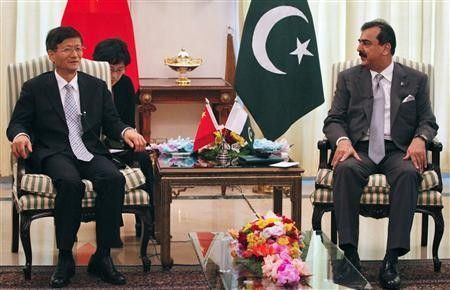Reading Pakistan, By The Numbers
Opinion

Is Pakistan an enemy of the United States? For the past two years, the Obama administration has doggedly maintained that the South Asian nation remains a vital American ally, even as it has grappled with what it itself admits is a complicated relationship.
The fiction of Pakistan's friendship, however, is becoming exceedingly hard to maintain, most of all because Pakistanis themselves don't believe it. The latest poll of Pakistani public opinion carried out by the Pew Global Attitudes Project , for example, has found that attitudes toward America-already profoundly negative-have declined still further. To wit, just eight percent of Pakistanis now see the United States as a partner, while nearly three-quarters (74 percent) view it as an enemy. Back in 2009, 64 percent of those surveyed did. Similarly, America's favorability rating, already low, has continued to deteriorate; from 16 percent in 2009 to 12 percent today.
These statistics speak volumes about the true state of relations between the United States and its most troublesome South Asian partner. So does Pakistan's own view of its geopolitical position. In the latest Pew poll, only 45 percent of respondents said it was important to improve ties with the U.S.-down from the 60 percent that held such a view just last year. Pakistan's population, in other words, is increasingly thinking beyond partnership with the United States.
This is perhaps most pronounced on the counterterrorism front. Back in 2009, 72 percent of Pakistanis supported U.S. financial and humanitarian support for their government's fight against Islamic extremists, and 63 percent supported American aid on intelligence and logistical matters as well. Today, by contrast, only half of all Pakistanis approve of U.S. economic and humanitarian aid, and just a third (37 percent) supports intel sharing and coordination.
As for military assistance, the numbers are even worse. Counterterrorism combat operations (carried out through special forces deployments or-increasingly-via drone strikes) have never been popular with Pakistanis, who have tended to view them as an unacceptable encroachment on their national sovereignty. When surveyed by Pew in 2010, less than a quarter (23 percent) of those polled supported such forceful intervention. And a series of Coalition missteps over the past two years has soured the Pakistani public on U.S. military action still further. This includes a tragic November 2011 operation by NATO forces in northwest Pakistan that left 24 Pakistani soldiers dead, precipitating a fundamental political rupture and causing the country to close its borders to the Coalition. Ill-will still prevails; less than a fifth of Pakistanis (17 percent) now support U.S. military operations on their soil, despite the persistence of Islamic extremists in their country's unruly border regions.
At least some policymakers in Washington still hold out hope that Islamabad might come around. In time, the thinking goes, Pakistan will resume its role as a critical transport corridor for materiel to the Coalition in Afghanistan, and step up cooperation with the West against Islamist militancy.
The numbers, however, suggest that Pakistan's divorce from the U.S. isn't fleeting, or tactical. Rather, it reflects a slow but building sea change in Pakistani strategic direction.
That direction isn't necessarily Islamist; the same Pew center poll found 55 percent of respondents to view al-Qaeda unfavorably (the same percentage as in 2011), and largely-negative attitudes toward the Taliban and its various factions to be more or less unchanged from previous years. China, by contrast, is seen by 90 percent of Pakistanis as an ally, particularly against regional rival India.
That's not good news for Washington, which currently could benefit from assistance-or at least political support-from Islamabad on a number of key strategic and security fronts. But, with an American disengagement from the War on Terror's first front now on the horizon, it's not too early for policymakers inside the Beltway to begin contemplating what a post-Afghanistan relationship with Pakistan might look like. Clearly, the Pakistanis themselves are already doing so.
Ilan Berman is Vice President of the American Foreign Policy Council in Washington, DC.
© Copyright IBTimes 2025. All rights reserved.





















